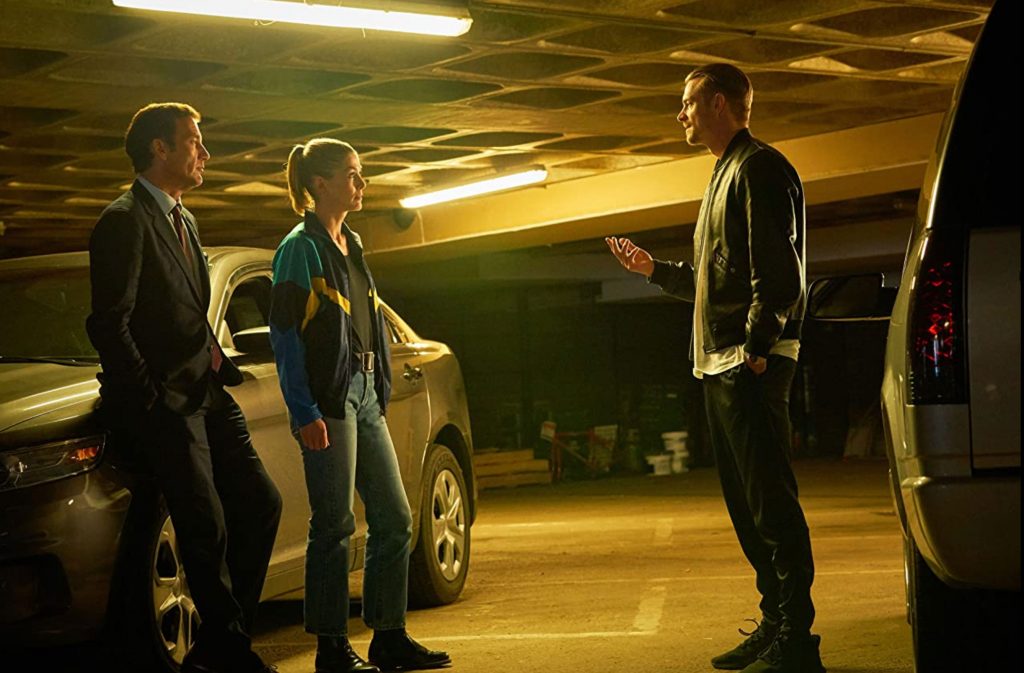May 13, 2023
by Carla Hay

Directed by Jon S. Baird
Some language in Japanese and Russian with subtitles
Culture Representation: Taking place in 1988, in the United States, Russia, the United Kingdom and Japan, the dramatic film “Tetris” (inspired by a true story) features a predominantly white cast of characters (with some Asians and a few African Americans) representing the working-class, middle-class and wealthy.
Culture Clash: Video game entrepreneur Henk Rogers gets caught up in a web of ruthless business deals and political intrigue in multiple countries, as he tries to obtain worldwide licensing rights to the game Tetris.
Culture Audience: Besides appealing to the obvious traget audience of Tetris fans, “Tetris” will appeal primarily to people who are fans of star Taron Egerton, video games that were launched in the 1980s, and movies about real-life business underdogs.

Combining 1980s entertainment nostalgia and 1980s Cold War history lessons, the dramatic film “Tetris” also mixes facts with fiction. In this lively retelling of the Tetris game origin story, the “race against time” plot developments are obviously exaggerated for the movie. However, the double dealings and business backstabbings ring true, in addition to navigating cultural differences. “Tetris” had its world premiere at the 2023 SXSW Film and TV Festival.
Directed by Jon S. Baird and written by Noah Pink, “Tetris” can get a little too over-the-top in how it depicts the story of one man versus corporate giants and the Russian government in the fierce competition to get worldwide rights to the video game Tetris. However, the cast members’ performances elevate the movie, which has some comedic elements that easily could have looked out-of-place with the wrong cast members. “Tetris” has a winking tone to it let viewers know that the filmmakers didn’t intend to make this movie entirely factual or entirely serious.
“Tetris” (a globetrotting story that takes place in 1988) also has a visual motif used to great effect: Many of the scenes have flashes of the live-action visuals presented as if they were in the format of a Tetris game or a video game from the late 1980s. The beginning of the movie also identifies the main characters as “players,” a word that can take on multiple meanings in the context of the story. The word “player” is also more than ironic because much of what happens in all these frantic business deals for Tetris is anything but fun and games.
“Tetris” begins by showing Henk Rogers, co-founder of the small, independent company Bullet-Proof Software at the Consumer Electronics Show (CES) in Las Vegas. Henk is of Indonesian-Dutch heritage but he was raised primarily in the United States and lives in Japan during the period of time that this story takes place. His multicultural background comes in handy in some ways, but in other ways it becomes a hindrance when people question his cultural loyalties.
Henk is trying and failing to make his new video game a hit at CES, which is a crucial event for Bullet-Proof Software. Henk has already taken out a bank loan to launch this video game, which he now knows is going to be a flop. But as fate would have it, Henk tries a new video game at the convention: It’s called Tetris, invented by a Russian computer expert named Alexey Pajitnov (played by Nikita Yefremov), who has a humble and unassuming personality.
Alexey does not own the rights to the game. Why? Because in the Communist country that was then known as the U.S.S.R. or Soviet Union, Alexey works for the government entity ELORG, which has monopoly control of the importing and exporting of Russian-made computer products. Anyone who wants the worldwide licensing rights to sell Tetris has to go through the Soviet government first.
In the simplest of terms, Tetris is a game where players try to make buildings out of falling building blocks. Henk is immediately hooked on Tetris and thinks it could be a massive worldwide hit. And he’s willing to bet his life savings and his home on what he wants to do next: partner with a major video game company to get the worldwide licensing rights to Tetris.
An early scene in “Tetris” shows Henk trying to convince a skeptical bank manager named Eddie (played by Rick Yune) to give Henk another bank loan, this time for this Tetris endeavor. After explaining what Tetris is about, Henk tells Eddie why Henk thinks Tetris is so special: “It stays with you. It’s the perfect game.” Henk also mentions that Tetris has become an underground hit in the Soviet Union/Russia, where people have been sharing bootleg copies of Tetris on floppy disks. Eddie reluctantly agrees to the loan, on the conditions that the loan will have a high interest rate and that Henk has to put up his home as collateral.
Henk ends up sneaking into Nintendo headquarters in Japan and meeting with Nintendo CEO Hiroshi Yamauchi (played by Togo Igawa) and Hiroshi’s assistant (played by Nino Furuhata) to broker for Nintendo the worldwide licensing rights to make Tetris for Nintendo cartridges and arcade machines. Henk turns down Nintendo’s initial offer of $500,000. Henk wants $2 million for the cartridges deal and $1 million for the arcade deal.
While still negotiating with Nintendo, Henk goes to Nintendo of America headquarters in Seattle, where he meets Nintendo of America CEO Minoru Arakawa (played by Ken Yamamura) and Nintendo of America senior vice president/general counsel Howard Lincoln (played by Ben Miles). Minoru and Howard show Henk a sneak peek of a product that has not gone on the market yet: Nintendo’s hand-held Game Boy system. Nintendo is planning to install the game Super Mario Land on all Game Boys, but Henk convinces Minoru and Howard that Tetris has broader appeal and should be the game installed on all Game Boys.
Henk has to contend with three British video game moguls, who at various times are his allies and enemies: duplicitous Robert Stein (played by Toby Jones), the founder/CEO of Andromeda Software; corrupt Robert Maxwell (played by Roger Allam), chairman of Mirrorsoft, a video game publisher; and arrogant Kevin Maxwell (played by Anthony Boyle), who is Robert’s son and the CEO of Mirrorsoft. Henk has been told that Robert Stein has gotten worldwide licensing rights for Tetris and has already made a deal with Mirrorsoft. Henk’s plan, with backing from Nintendo, is to buy out the rights from these British businessmen.
The rest of the movie shows Henk wheeling and dealing, while often getting undercut and betrayed by some people he thought were trustworthy business colleagues. Video game companies Sega and Atari, which were Nintendo’s main rivals at the time, also get in the mix because they also want Tetris. Meanwhile, Henk has to spend a lot of time in Russia (where he eventually meets Alexey) and finds out the hard way that doing a capitalist business deal in a Communist country is a lot more dangerous than he ever thought it could be.
Henk’s family life also suffers because of his obsession to close this deal. His patient wife Akemi Rogers (played by Ayane Nagabuchi), who co-founded Bullet-Proof Software with Henk, handles the managerial administration of the company’s small staff of employees while Henk is in charge of all the sales and marketing. Henk and Akemi have three children: 10-year-old Maya Rogers (played by Kanon Narumi), 8-year-old Julie Rogers (played by Karin Nurumi), and 6-year-old Kevin Rogers. Maya has an important dance performance that she doesn’t want Henk to miss. You can easily predict what will happen.
Meanwhile, in Russia, Henk is assigned a translator named Sasha (played by Sofia Lebedeva), who also educates Henk on Russian and Communist cultures. Henk soon finds out that he is being spied on by the Soviet government. Two of the ELORG officials who have been monitoring Henk are Valentin Trifonov (played by Igor Grabuzov) and Nikolai Belikov (played by Oleg Shtefanko). One of these ELORG officials is much worse than the other.
Egerton portrays Henk as an optimistic charmer who thinks he can talk his way in and out of situations but finds out that he sometimes gets in way over his head. He adeptly handles movie’s drama and comedy. Lebedeva is another standout as translator Sasha, who develops a friendly rapport with Henk and possibly becomes romantically attracted to him. Allam and Boyle provide some sardonic comic relief in portraying the love/hate relationship between Robert Maxwell and Kevin Maxwell. A running joke in the movie is Robert Maxwell’s bragging about being a friend of Mikhail Gorbachev (played by Matthew Marsh), who was the Soviet Union’s president at the time.
Even though “Tetris” couldn’t possibly include portrayals of all the people involved in these complex deals, there are still many characters to keep track of in the story. Luckily, “Tetris” is written well enough to juggle all of these moving pieces in a briskly paced manner, much like how skilled Tetris players navigate the game. The movie’s adrenaline-pumping climax is pure fabrication, but it’s the most memorable aspect of this thriller. “Tetris” strikes the right balance of being escapism and a reality check for how landmark business deals often happen under circumstances that can be stranger than fiction.
Apple Studios released “Tetris” in select U.S. cinemas on March 24, 2023. Apple TV+ premiered the movie on March 31, 2023.


